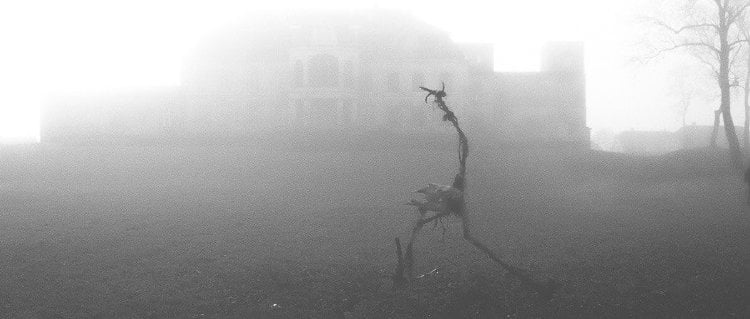November

In a nineteenth century Estonian village, peasants sell their souls to the Devil (Jaan Tooming) in exchange for a soul for their kratts, 'living' mechanical devices constructed of farming implements, bicycle seats and animal skulls that work when they're not being ornery and mischievous. The people also steal from the German speaking Baron (Dieter Laser, "The Human Centipede") whose estate looms over their hovels when they're not trying to trick the Plague into leaving them alone or visiting with dead relatives. Farmer's daughter Liina (Rea Lest) is dismayed by the old man her father has promised her to as she's in love with local boy Hans (Jörgen Liik), but her love will be tested as Hans only has eyes for the Baron's daughter (Jette Loona Hermanis) in "November."
Laura's Review: B
If Canada's Guy Maddin collaborated with Czech stop motion animator Jan Švankmajer using an abandoned location from a Bela Tarr film, the result might be something like this strange (and often strangely humorous) gothic fairy tale. Adapting Andrus Kivirähk's 'Rehepapp,' a novel whose popularity in Estonia makes me want to visit the country, writer/director Rainer Sarnet has made an eerily beautiful ode to unrequited love, one with werewolves, a witch and a talking boar. Cinematographer Mart Taniel's black and white photography is often stunning, although its clarity occasionally works against it, allowing the inherent artificiality of filmmaking to peek through. What both Sarnet and Taniel get remarkably right is how they present the faces of their world. Some look like apple dolls, deep wrinkles filled with the earth that gives them livelihood. Others, like Liina and the Baroness, are fresh faced beauties, only Liina's dress and grimy fingernails distinguishing her from her rival. Some faces collapse upon themselves, others feature bristly beards and in one fabulous sequence, each is briefly framed as they present themselves for communion. The Devil could pass for a Kabuki player who enjoys overacting. Equally wondrous are the kratts, Liina's father's introduced roping a cow with a chain, then rising into the air, it's three scythe-like 'legs' acting as propellers (later it will position itself over an indoor bucket to relieve itself). Hans creates one from a sinister snowman, its countenance increasingly evil as it melts. Wolves are gorgeous creatures, cows benign (and possibly once human), but the boar that threatens in a barn (where everyone has put their pants on their heads to fool the plague into thinking they have 'double arses') could give "The Witch's" Black Phillip pause. The most wondrous scenes take place in the forest, its trees right out of a folk art painting casting shadows in the gloom, and in remembrances of Venice, Taniel's overexposed lighting creating otherworldly canals where gondolas glide. There is tenderness when Sander (Heino Kalm) takes the hand of a self-described old hag who once loved him from afar, perhaps foretelling Liina's fate. In a place where souls are both cherished and bartered, goodness is a risky commodity. Grade:

